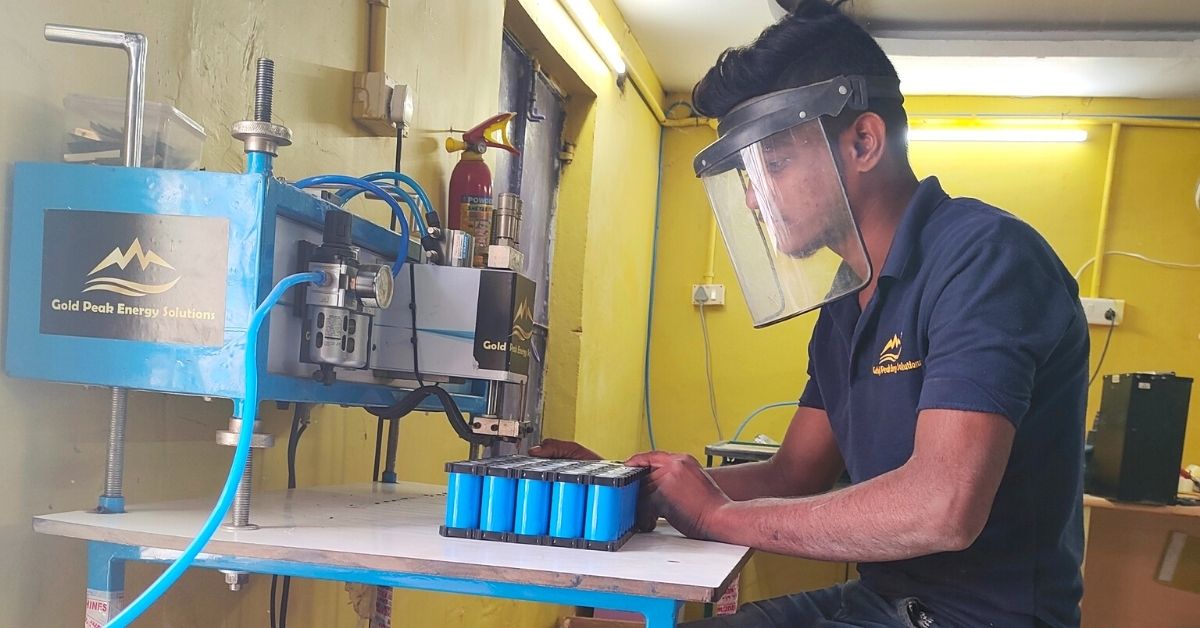The unabated fuel price hikes affect us all, but the low-income and poor face the maximum heat.
The situation for Viswanath Kari, a resident of Visakhapatnam in Andhra Pradesh, was no different. “I belonged to a lower-middle-class family, and we could not afford a two-wheeler,” he tells The Better India.
Viswanath says his father cycled 40 km to work while he walked a distance of 4 km to school. Over the years, his family’s financial condition improved marginally. “Though we could afford a two-wheeler, maintaining and paying for fuel always seemed out of capacity,” he recollects.
However, the same constraints inspired him to become an entrepreneur and conceive an EV startup to offer affordable commute — targeting the lower strata of society.
An effort for the marginalised

In 2012, Viswanath completed his management degree in marketing and worked with companies like JustDial, Oyo Rooms and the global IT giant IBM.
“After gaining experience in the corporate sector, I felt the need to start my business. I had multiple ideas, but the childhood memory of being unable to afford a two-wheeler was etched in my mind. It was fortunate that the EV sector had picked up in India when I decided to dive in,” the 34-year-old says.
In 2019, Viswanath launched Royal EV, which manufactures vehicles and offers batteries inspired by Tesla, promising long life and durability.
“A few units of battery charge can enable one to travel 100 km while one needs to spend at least Rs 200 to travel the same distance in an internal combustion engine (ICE) vehicle. The same distance can be achieved in less than 1/3rd its cost using a battery-powered EV,” he explains.
The startup’s uniqueness lies in the batteries that promise outstanding performance. “A conventional battery used in EVs available in the market have lithium-ion or lead batteries. However, I used the technology inspired by Tesla to make LiFePO4 (lithium ferrophosphate) batteries. They are safe and durable compared to others,” he assures.
Viswanath says the batteries are safer as they do not catch fire in case of a puncture or incident of battery-casing damage and are eco-friendly.
“They have high performance and a long shelf-life. A conventional battery has a life of about 400 recharge cycles. It means that the battery starts deteriorating, and performance reduces after the designated recharge cycles are complete. However, the batteries we offer have 2,000 cycles, making them far more efficient than the ones available in the market,” he says.
The startup has sold over 2,000 batteries in the past year and has customers across India.
Watch review of Royal EV vehicles
Somesh, an EV battery dealer in Paharganj, Delhi, says, “I have been purchasing EV batteries from Royal EV for the past seven months and have received encouraging feedback from the customers. I have also installed it for my EV and find it performing better than others. Considering the quality product and response from customers, I plan to extend my relationship to own a franchisee of the company.”
However, Viswanath says success has not come easy. “I am the first generation entrepreneur in the family and had no experience in the business. I was fortunate to have a skill set in marketing and exposure to the corporate sector but working towards product development and gaining knowledge in the field was a different ball game altogether. I spent almost two years learning and working on the same,” he says.
He adds that the lack of a skilled workforce in the southern part of India in Andhra Pradesh was another challenge to overcome. “Besides, the business needed raising of large capital. I relied on personal savings, my friends and banks to seed the money in the enterprise. Currently, I am working towards expanding the company by attracting investors,” he says.
To make two-wheeler EVs affordable, Viswanath has built two prototypes, which are undergoing last stage refinement before being launched.
Viswanath says he will continue his pursuit of making two-wheelers affordable. “I aim to launch the EVs between the price range of Rs 50,000 and Rs 70,000, which will be lower compared with the fuel operated vehicles and easy on the pocket to maintain. I hope many lower-income groups can afford the luxury my family could not,” he adds.
To know more details about the startup, click here.
Edited by Yoshita Rao
No comments:
Post a Comment